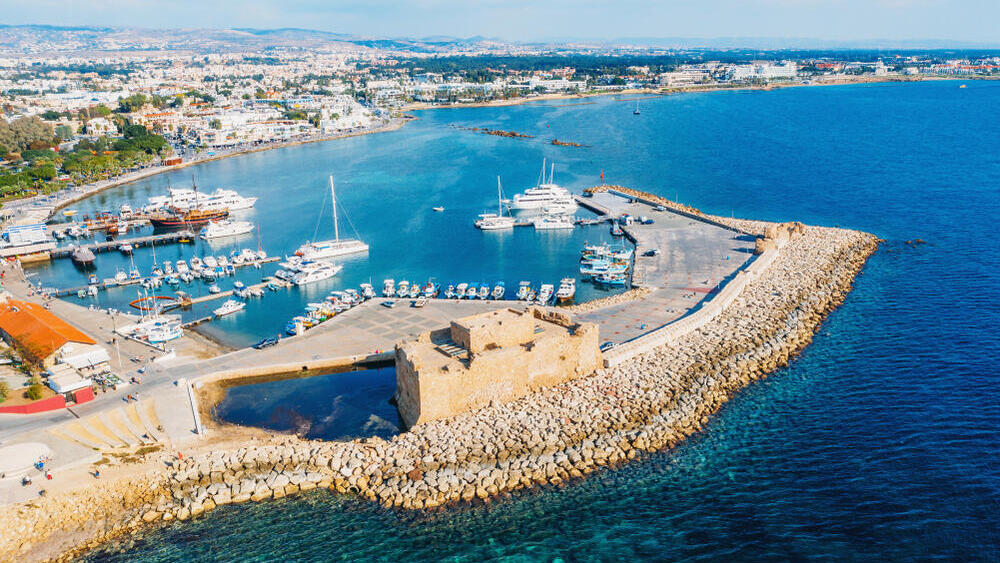A recent wave of Israeli real estate purchases in Cyprus has ignited a surge of antisemitic rhetoric and political agitation on the island. The backlash peaked during a recent congress of AKEL, Cyprus’s second-largest party, where party secretary-general Stefanos Stefanou claimed that Israelis buying land near critical infrastructure and sensitive areas pose a serious national threat.
“If we don’t take effective action now, one day we’ll find that this country is no longer ours,” Stefanou warned, alleging that Israeli buyers are part of a broader strategy involving the creation of closed communities, Zionist schools, synagogues and influence over key economic sectors. He accused the government of allowing “uncontrolled” land sales and called on President Nikos Christodoulides to intervene immediately.
AI generated antisemetic video
Stefanou insisted his remarks were not motivated by xenophobia or antisemitism, but by genuine concerns over national sovereignty, claiming that this is how “Jews took over land” in Israel as well. He also accused Israelis of purchasing property in the Turkish-occupied north of the island. However, he ignored the fact that citizens of other non-EU countries are also actively investing in Cypriot real estate.
In a highly unusual move, Palestinian Ambassador to Cyprus Abdullah Atari addressed the congress as a speaker—the first time a foreign envoy has done so at a domestic party event. Cyprus is set to hold parliamentary elections this June, and some observers believe AKEL is using its criticism of Israel to rally voter support.
AKEL, a leftist party with communist roots, has long held an anti-Israel stance that has hardened since October 7. While it frequently condemns Israeli actions in Gaza using terms such as “genocide,” “ethnic cleansing” and “war crimes,” this marked the first time its leader publicly employed overtly antisemitic language.
Get the Ynetnews app on your smartphone: Google Play: https://bit.ly/4eJ37pE | Apple App Store: https://bit.ly/3ZL7iNv
Stefanou’s remarks sparked significant backlash. Politicians from centrist parties and multiple journalists condemned the rhetoric, though the Cypriot government declined to comment. Israeli Ambassador to Cyprus Oren Anolik responded sharply, saying: “With deep concern, we observe and condemn the emergence of uncharacteristic antisemitic rhetoric in Cyprus’s public discourse—rhetoric that, under the guise of ‘political concern,’ revives dark patterns from the past: collective blame, conspiracy theories and veiled scapegoating.”
Anolik said Stefanou’s claims echoed the kind of rhetoric that once led Europe into its darkest chapter. “Diplomats are trained to avoid interference in internal political debates. But there are moments when silence can be misinterpreted or exploited. When a line is crossed—when a community is targeted—when a shared value is threatened, we must speak out,” he said. “Fighting antisemitism is not just about remembering history—it’s about political vigilance and moral responsibility. When antisemitism appears, even in disguise, it must be named and rejected clearly, without caveats.”
The ambassador emphasized that Cyprus, a country with a strong democratic tradition, recognizes the rights of foreigners to open schools, practice religion, and invest and live freely, so long as they respect the law. “These are hallmarks of a liberal state, not signs of weakness,” he said. “What truly threatens social cohesion and democratic stability is the obsessive spread of invented narratives about ‘Zionist plans,’ ‘takeovers,’ and ‘ghettos.’”
He stressed that Cyprus and Israel are bound by a deep and growing friendship based on shared democratic values, mutual respect and expanding people-to-people ties. “This relationship is rooted in openness, dialogue and pluralism. Diverse opinions do not undermine its strength, but are undermined by hatred and prejudice. We welcome the many Cypriot voices who have spoken clearly against this rhetoric and urge all responsible actors in public life to reject antisemitism, fearmongering and collective demonization—clearly and unequivocally.”
Anolik’s response received wide coverage in Cypriot media, though AKEL supporters distorted his remarks, portraying them as an attack on the party’s stance toward Gaza. AKEL representatives argued that anyone who disagrees with Israeli policy is automatically labeled antisemitic. The ambassador later issued a clarification, stating that his condemnation referred specifically to Stefanou’s rhetoric, not to positions on Gaza.
TikTok hate campaign: “Cyprus was promised to us”
In addition to Stefanou’s statements, an antisemitic campaign has been circulating on TikTok and other platforms. One widely shared video features a man dressed as an ultra-Orthodox Jew, speaking in an Israeli-accented Hebrew, claiming that Israelis are buying up land in Cyprus non-stop because “God promised us Cyprus after Israel.”
In another clip, a female journalist asks the same man: “Why are you stealing our homes?” He replies: “If we don’t steal them, someone else will.” The song “Hava Nagila” plays in the background. A third video shows the man wrapped in a tallit (Jewish prayer shawl) declaring, “Cyprus was promised to us 3,500 years ago—finally, I’m home.”
The campaign echoes online discourse claiming Israelis are pricing out locals. “Cypriots can’t afford to buy homes for themselves or their children anymore,” one post reads. “The Israelis are buying everything.”
Official figures estimate that around 2,500 Israelis reside in Cyprus. However, since many enter with European passports, unofficial estimates place the real number at 12,000 to 15,000. In addition, many Israelis purchase properties on the island as investment assets.







